Enterprise ecommerce platforms aren’t just about selling products—they’re about managing huge inventories, scaling across regions, integrating with other systems, and delivering a seamless experience across every touchpoint.
Whether you’re replatforming or launching a high-growth store, I’ve tested and researched the most reliable enterprise ecommerce solutions on the market.
Below are my top recommendations for 2025, based on platform features, pricing, scalability, integrations, and overall value for large businesses.
Quick Comparison: Best Enterprise Ecommerce Platforms
| Platform | Best For | Starting Price (USD) | Headless Support | Free Trial | AI Features |
|---|---|---|---|---|---|
| Shopify Plus | Fast-scaling DTC brands | $2,000/month+ | Partial | Contact sales | Yes |
| BigCommerce Enterprise | SEO and catalog-heavy businesses | $1,500/month+ | Yes | Yes | Yes |
| Adobe Commerce (Magento) | Deep customization and B2B | $22,000/year+ | Yes | No | Yes (Adobe Sensei) |
| Salesforce Commerce Cloud | Salesforce-powered ecosystems | $250,000/year+ | Partial | No | Yes (Einstein) |
| Commercetools | Fully custom, API-first builds | $10,000/month+ | Yes | No | No (dev-focused) |
| VTEX | Global brands & marketplaces | $5,000/month+ | Yes | Yes | Yes |
| Elastic Path | Composable commerce experiences | $10,000/month+ | Yes | Yes | No |
Our Top 7 Enterprise Ecommerce Platforms for 2025
1. Shopify Plus – Best for Fast-Scaling Brands
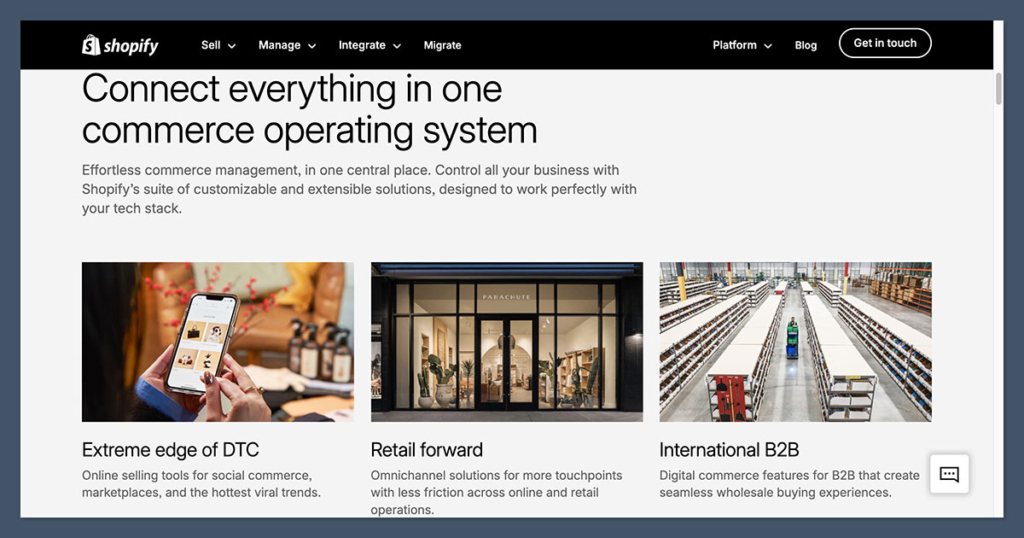
Rating: 4.8/5
Starting price: $2,000/month
Headless support: Limited
Best for: High-growth brands needing ease, speed, and reliability
Shopify Plus is built for brands scaling fast. You can run high-traffic stores, manage flash sales, and integrate with major systems without much tech overhead.
The real win here is speed—Shopify Plus gets you up and running fast, with built-in tools and robust performance.
During testing, setup times were faster than most other platforms, especially when launching multiple storefronts or handling large product catalogs.
✔️ Pros
- Excellent uptime and speed
- Native POS, payment, and shipping solutions
- Built-in automation (Shopify Flow)
- Huge ecosystem of apps
❌ Cons
- Checkout customization is limited
- Liquid template language has a learning curve
- Higher transaction fees without Shopify Payments
Who it’s best for
Direct-to-consumer brands like Gymshark, Kylie Cosmetics, and Allbirds. Perfect for brands needing a low-maintenance platform that scales easily.
2. BigCommerce Enterprise – Best for SEO and Flexibility
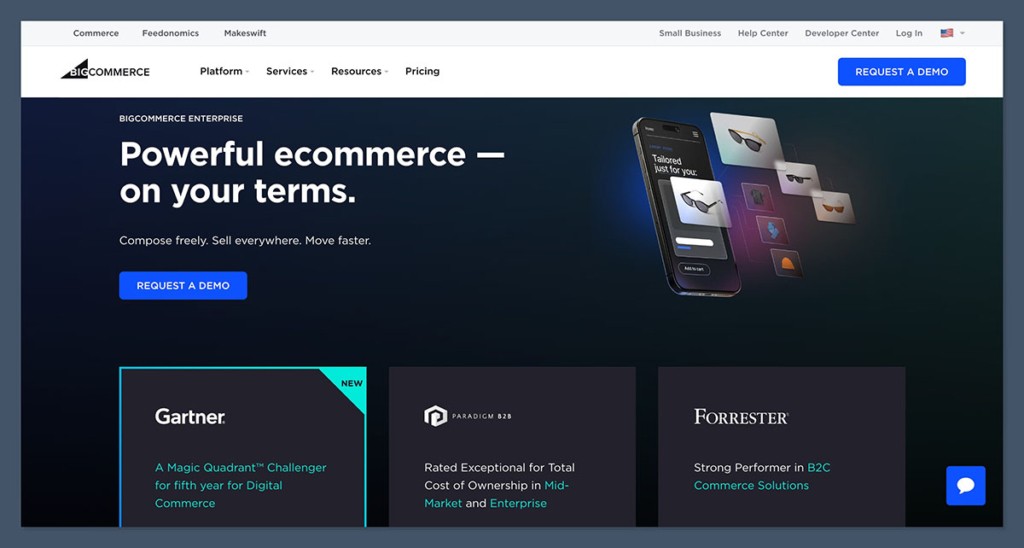
Rating: 4.6/5
Starting price: $1,500/month
Headless support: Yes
Best for: SEO-focused brands with large catalogs
BigCommerce Enterprise gives you a great blend of native features and design freedom. If SEO matters to you (and it should), this is the better alternative to Shopify.
You can build multi-storefront setups, customize URLs, and manage 600+ SKUs without third-party apps.
✔️ Pros
- Native faceted search and advanced filtering
- Excellent SEO control
- Multi-storefront from one backend
- No platform transaction fees
❌ Cons
- Smaller app ecosystem than Shopify
- Themes can be harder to customize
- Limited B2B features out of the box
Who it’s best for
Mid-size to large businesses that need strong SEO, catalog management, and built-in scalability. Also great for businesses that plan to go headless in the future.
3. Adobe Commerce (Magento) – Best for Full Customization
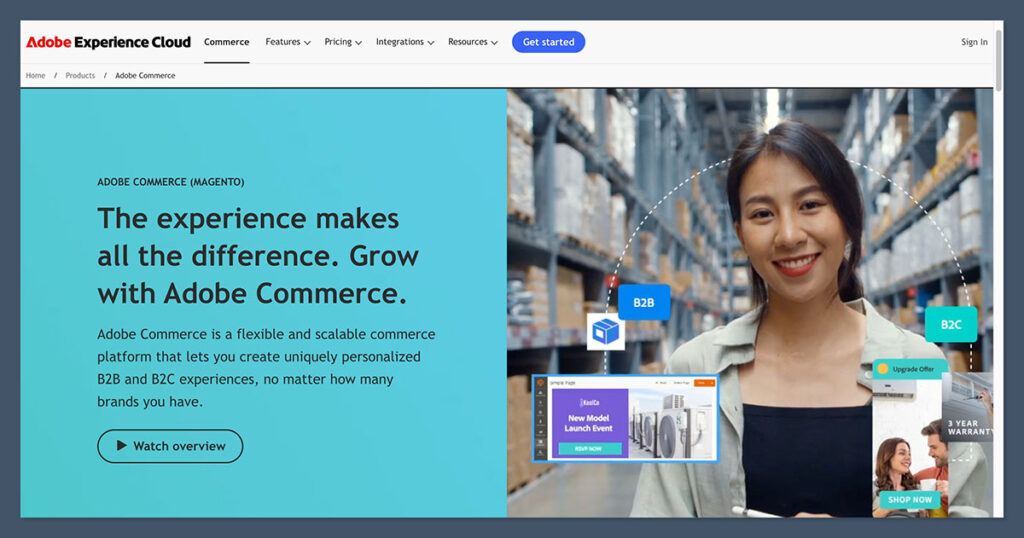
Rating: 4.5/5
Starting price: $22,000/year
Headless support: Yes
Best for: Custom, complex ecommerce experiences
If you have a dev team and a big wishlist, Adobe Commerce is still the powerhouse.
You get full control over your storefront, backend, checkout, pricing logic, and integrations.
Adobe’s cloud version also includes AI features through Adobe Sensei and is bundled into their enterprise ecosystem.
✔️ Pros
- Fully customizable
- Advanced B2B features (custom pricing, quoting, catalogs)
- Supports multi-brand, multi-language stores
- Rich extension marketplace
❌ Cons
- Expensive to build and maintain
- Long time-to-launch
- Not user-friendly without a development team
Who it’s best for
Enterprises with complex needs and strong internal tech teams or agency support. Think fashion brands with product personalization, or wholesalers selling across multiple tiers.
4. Salesforce Commerce Cloud – Best for Salesforce Ecosystem Users
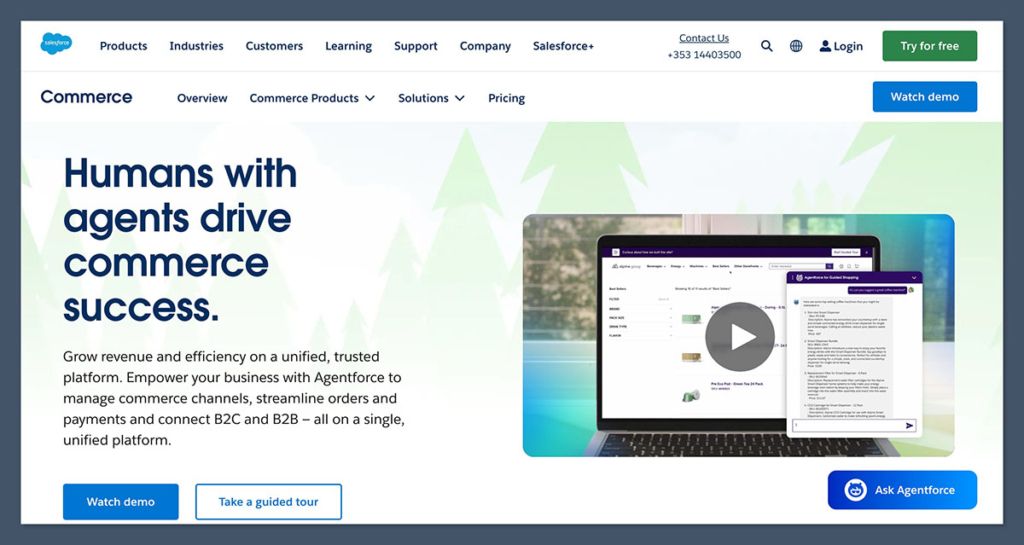
Rating: 4.3/5
Starting price: $250,000/year+
Headless support: Limited
Best for: Multinational retailers already using Salesforce products
Salesforce Commerce Cloud is built for enterprise retailers managing huge inventories and customer journeys across every channel.
It’s tightly integrated with Salesforce CRM, which makes it ideal for personalized shopping, omnichannel marketing, and customer lifecycle tracking.
✔️ Pros
- Deep personalization via Einstein AI
- Native support for omnichannel selling
- Seamless CRM, service, and marketing integrations
- Built-in A/B testing and analytics
❌ Cons
- High cost of entry
- Long setup time
- Limited design flexibility out of the box
Who it’s best for
Global brands heavily invested in Salesforce tools. Great for those with large digital teams who want a centralized view of customer data and marketing.
5. Commercetools – Best for Headless Commerce
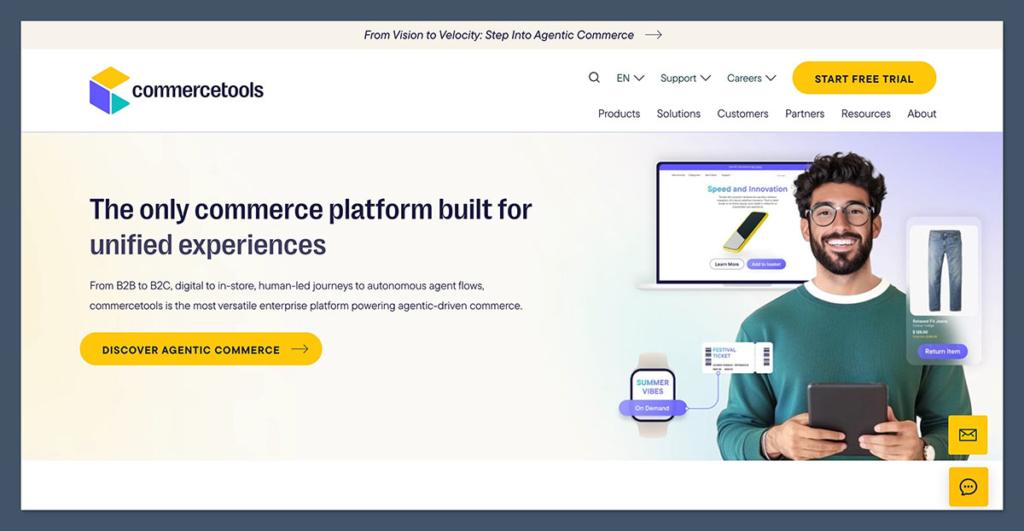
Rating: 4.3/5
Starting price: $10,000/month
Headless support: Yes (core focus)
Best for: API-first, composable commerce builds
Commercetools is the definition of headless ecommerce.
You don’t get a traditional storefront. Instead, you get APIs to build whatever you want—mobile apps, web stores, kiosks, marketplaces.
It’s a developer’s playground, and it’s meant for teams building custom frontends across multiple channels.
✔️ Pros
- Built entirely on MACH principles
- Scales globally without code refactoring
- Works with any frontend or CMS
- Deep integrations via APIs
❌ Cons
- Requires strong dev team
- No themes or visual editor
- No built-in frontend
Who it’s best for
Large teams building fully customized, multi-channel commerce experiences from scratch. Ideal for brands using Jamstack or composable architecture.
6. VTEX – Best for Global Brands and Marketplaces
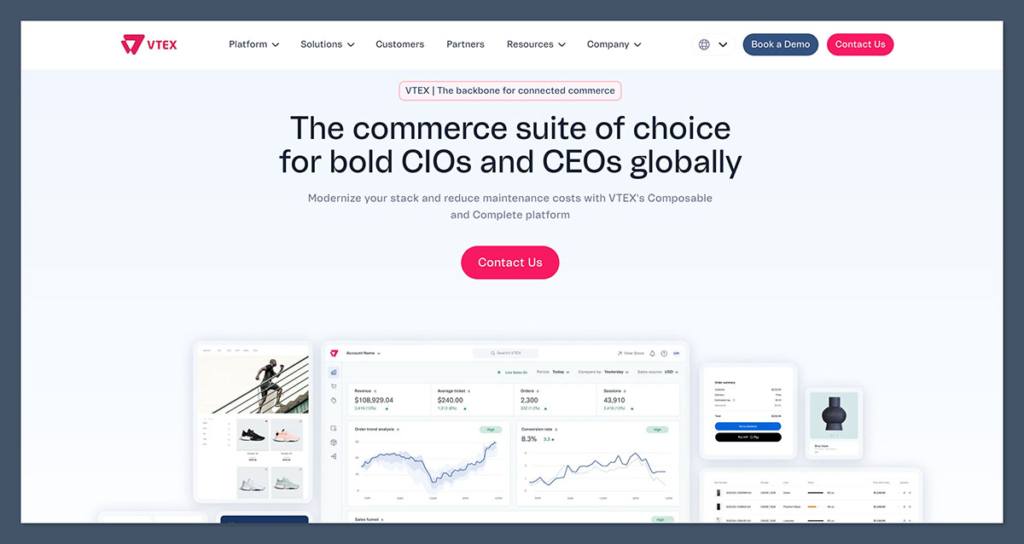
Rating: 4.2/5
Starting price: $5,000/month
Headless support: Yes
Best for: Brands selling across multiple channels and countries
VTEX combines marketplace selling, B2B, and DTC in one platform.
It’s growing fast among international retailers because of its unified OMS, strong localization tools, and built-in marketplace functionality.
If you’re selling across borders and managing multiple sellers, it deserves a closer look.
✔️ Pros
- Built-in marketplace support
- Global-ready (multi-language, multi-currency)
- Strong B2B and B2C features
- Headless support and APIs available
❌ Cons
- Requires onboarding support
- Smaller community in North America
- Limited documentation compared to older platforms
Who it’s best for
International companies that need flexibility across B2B, DTC, and third-party marketplace selling.
7. Elastic Path – Best for Composable Ecommerce
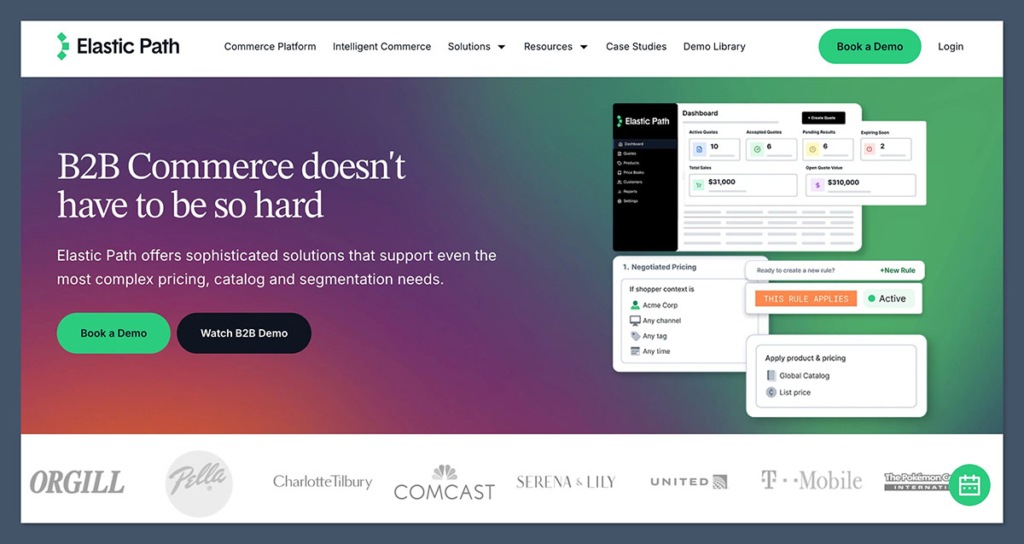
Rating: 4.1/5
Starting price: $10,000/month
Headless support: Yes
Best for: Teams building modular, composable commerce stacks
Elastic Path is designed to help brands assemble their ideal tech stack.
You can pair it with any CMS, frontend, PIM, or ERP.
It’s especially useful for businesses that want to own the frontend experience but don’t want to build ecommerce logic from scratch.
✔️ Pros
- Fully composable and modular
- Fast to deploy with pre-built commerce services
- Strong enterprise support
- Headless-first
❌ Cons
- No native storefront
- Steep learning curve
- Smaller ecosystem
Who it’s best for
Enterprises transitioning to a modular architecture and building their own tech stack with full flexibility.
Key Takeaways
- Shopify Plus is best for growing DTC brands that want ease, speed, and reliability
- BigCommerce Enterprise offers the best balance between SEO, flexibility, and ease of use
- Adobe Commerce is ideal for full custom control but requires development support
- Salesforce Commerce Cloud works well if you’re already using Salesforce tools
- Commercetools and Elastic Path are great for headless and composable builds
- VTEX is perfect for international brands managing multiple selling models
Final Thoughts
Choosing the right enterprise ecommerce platform isn’t about chasing the most features. It’s about what fits your infrastructure, team, budget, and growth strategy.
If you want something user-friendly with good built-in tools, go for Shopify Plus or BigCommerce.
If your site needs to run complex workflows and deep customization, look into Adobe Commerce, Commercetools, or Elastic Path.
Before you commit, take advantage of demos, trials, or pilot projects. That’s the best way to test how well a platform actually supports your workflows.






